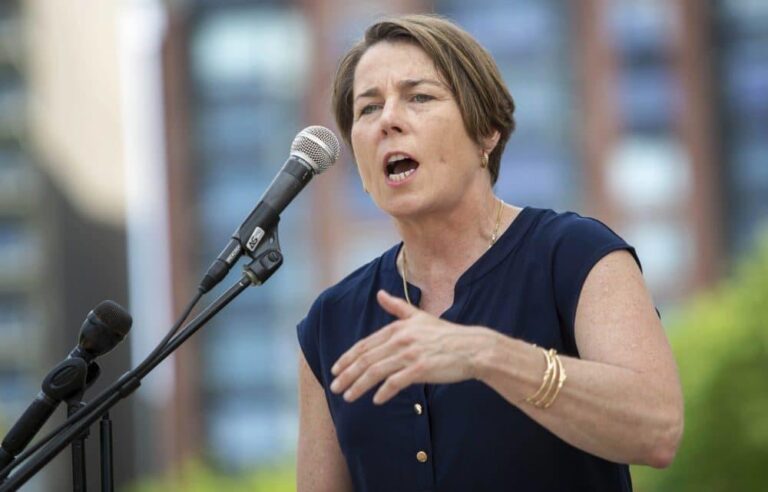Massachusetts Governor Maura Healey has signed a landmark $60.9 billion state budget into law, marking a notable financial blueprint for the fiscal year 2026. The budget, approved on June 30 and signed shortly thereafter, reflects a strategic approach to managing state resources while also granting the administration expanded authority to implement cost-cutting measures. This budget deal arrives amid broader national policy changes and represents a critical step in shaping the Commonwealth’s fiscal priorities and public spending for the year ahead. [1][2]
Table of Contents
- Governor Maura Healey Approves Record State Budget with Focus on Education and Healthcare
- Increased Funding Targets Infrastructure and Climate Initiatives Across Massachusetts
- Budget Allocations Aim to Strengthen Social Services and Support Vulnerable Communities
- Experts Recommend Enhanced Oversight to Ensure Effective Use of State Funds
- To Wrap It Up
Governor Maura Healey Approves Record State Budget with Focus on Education and Healthcare
Governor Maura Healey has signed off on a historic $60.9 billion state budget that marks the largest investment in Massachusetts’ history. Central to the deal is a robust commitment to education and healthcare, sectors that have seen significant funding increases to meet the evolving needs of residents. This budget allocates ample resources to public schools, higher education institutions, and pioneering healthcare initiatives aimed at expanding accessibility and improving quality of care across the state.
The budget features several key priorities to enhance community well-being and economic opportunity, including:
- Expanded funding for K-12 education programs to reduce class sizes and modernize school facilities.
- Increased support for mental health services integrated within both public health systems and schools.
- Investments in affordable healthcare access, targeting underserved and rural communities.
- Strengthening workforce development through vocational training and partnerships with higher education.
This groundbreaking budget is expected to bolster the state’s long-term growth and equity efforts, reflecting Governor Healey’s vision of a healthier, more educated Massachusetts for all its residents.
Increased Funding Targets Infrastructure and Climate Initiatives Across Massachusetts
The newly ratified $60.9 billion state budget marks a historic investment in Massachusetts’ infrastructure,earmarking substantial funds to modernize transportation networks,upgrade public facilities,and strengthen climate resilience efforts. A significant portion of the budget focuses on repairing aging roads and bridges while expanding lasting transit options to reduce congestion and emissions. Additionally,the allocation supports innovative projects aimed at enhancing clean energy deployment and protecting coastal communities from climate-related threats.
Key priorities include:
- Accelerated funding for electric vehicle charging stations across the state
- Upgrades to wastewater and stormwater systems to mitigate flood risks
- Investment in renewable energy infrastructure including solar and offshore wind
- Support for green building initiatives within public schools and government buildings
These targeted investments demonstrate a clear commitment to positioning Massachusetts as a leader in environmental stewardship and infrastructure innovation, fostering economic growth while safeguarding natural resources for future generations.
Budget Allocations Aim to Strengthen Social Services and Support Vulnerable Communities
The recently signed budget dedicates substantial funding to enhance social service programs, emphasizing a comprehensive approach to addressing the needs of vulnerable populations. This includes bolstering mental health services, expanding access to affordable housing, and increasing support for food security initiatives. By prioritizing these areas,the administration aims to reduce disparities and create a stronger safety net for individuals and families facing economic hardships.
Key investments include:
- Increased funding for community health centers and behavioral health programs
- Expanded rental assistance and homelessness prevention measures
- Enhanced resources for childcare and early childhood development
- Targeted support for underserved and marginalized groups
These allocations reflect a strategic commitment to fostering resilience within communities, ensuring that essential services remain accessible and effective. The budget’s design not only addresses immediate social challenges but also lays groundwork for long-term stability and equity.
Experts Recommend Enhanced Oversight to Ensure Effective Use of State Funds
Policy analysts and budget experts emphasize the necessity of stringent oversight mechanisms to guarantee that the recently approved $60.9 billion budget is allocated efficiently. They highlight that enhanced transparency and regular auditing processes will be critical in preventing mismanagement and ensuring that funds directly support priority programs such as education,healthcare,and infrastructure.
Among the recommended strategies are:
- Independent budget review boards to monitor disbursement and expenditures
- Improved reporting standards for state departments to foster accountability
- Community engagement initiatives to promote public awareness of spending priorities
Experts assert that without these measures, the enterprising spending blueprint risks falling short of its goals. They call on lawmakers and Governor Healey’s administration to act decisively to safeguard taxpayer dollars and maximize the socio-economic impact of the budget.
To Wrap It Up
Governor Maura Healey’s signing of the $60.9 billion state budget marks a pivotal step in shaping Massachusetts’ fiscal landscape for the coming year. As the state moves forward under this new budget, stakeholders across sectors will be closely watching its impact on public services, economic development, and social programs. With the approval of this comprehensive funding plan, Healey and state lawmakers have set a course aimed at addressing both immediate needs and long-term priorities for Massachusetts residents.

